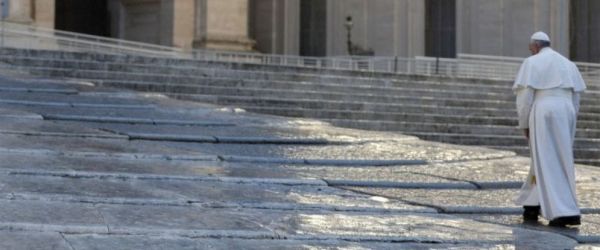Today’s Gospel reading (cf. Mt 5:17-37) is on the “Sermon on the Mount” and deals with the subject of the fulfilment of the Law: how should I fulfil the Law, how can I do it? Jesus wants to help his listeners take the right approach to the prescriptions of the Commandments given to Moses, urging them to be open to God who teaches us true freedom and responsibility through the Law. It is a matter of living it as an instrument of freedom. Let us not forget this: to live the Law as an instrument of freedom, which helps me to be freer, which helps me not to be a slave to passion and sin. Let us think about war, let us think about the consequences of war, let us think of that little girl who died due to the cold [temperatures], in Syria the day before yesterday. So many calamities, so many. This is the result of passion, and people who wage war do not know how to master their passions. They do not comply with the law. When one gives in to temptation and passion, one is not the master and agent of one’s own life, but rather one becomes incapable of managing it with willingness and responsibility.
Jesus’ discourse is divided into four antitheses, each one expressed by the formula: “You have heard that it was said... But I say to you”. These antitheses refer to as many situations in daily life: murder, adultery, divorce and swearing. Jesus does not abolish the prescriptions concerning these issues, but he explains their full meaning and indicates the spirit in which they must be observed. He encourages us to move away from the formal observance of the Law to substantive observance, accepting the Law in our hearts, which is the centre of the intentions, decisions, words and gestures of each of us. From the heart come good and bad deeds.
By accepting the Law of God in our heart, one understands that, when one does not love one’s neighbour, to some extent one kills oneself and others, because hatred, rivalry and division kill the fraternal charity that is the basis of interpersonal relationships. And this applies to what I have said about war and also about gossip, because words kill. By accepting the Law of God in our heart one understands that desires must be guided, because one cannot obtain everything one desires, and it is not good to give in to selfish and possessive feelings. When one accepts the Law of God in one’s heart, one understands that one must give up a lifestyle of broken promises, as well as move from the prohibition of perjury to the decision not to swear at all, behaving sincerely to everyone.
And Jesus is aware that it is not easy to live the Commandments in such an all-encompassing way. That is why he offers us the help of his love: he came into the world not only to fulfil the Law, but also to give us his grace, so that we can do God’s will, loving him and our brothers and sisters. We can do everything, everything, with the grace of God! Indeed, holiness is none other than guarding God’s freely given grace. It is a matter of trusting and entrusting ourselves to him, to his Grace, to that freedom that he has given us, and welcoming the hand he constantly extends to us, so that our efforts and our necessary commitment can be sustained by his help, overflowing with goodness and mercy.
Today Jesus asks us to continue on the path of love that he has indicated to us and which begins from the heart. This is the path to follow in order to live as Christians. May the Virgin Mary help us to follow the path traced by her Son, to reach true joy and to spread justice and peace everywhere.
[Pope Francis, Angelus 16 February 2020]












